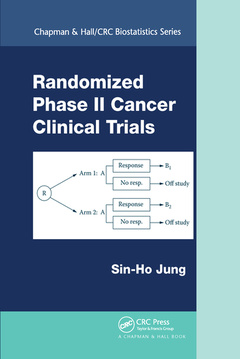Description
Randomized Phase II Cancer Clinical Trials
Chapman & Hall/CRC Biostatistics Series
Author: Jung Sin-Ho
Language: English
Subjects for Randomized Phase II Cancer Clinical Trials:
Keywords
Simon’s Optimal Design; Sample Size Calculation; traditional phase II cancer trial; Cumulative Distribution Functions; cancer research; Log Rank Test; statistical methods for single-arm phase II trials; Single Stage Design; designing and analyzing phase II trials; Minimax Design; randomized phase II trials with a prospective control; Interim Analysis; comparing an experimental therapy with a prospective control therapy; Accrual Period; phase II cancer clinical trials; Experimental Therapy; methods for randomized phase II trials in oncology; Cumulative Hazard Function; flexible phase II clinical trial designs; Exponential Survival Distribution; Log Rank Statistic; Mantel Haenszel Test; Accrual Rate; Interim Analysis Time; Survival Distribution; Hazard Rate Λ0; Exponential Survival Models; Generalized Log Rank Test; Pet Positive Patient; P1 P2; Conditional Type; Standard Log Rank Test; Sample Size Calculation Procedure; Experimental Arms
Publication date: 06-2020
· 15.6x23.4 cm · Paperback
Publication date: 05-2013
229 p. · 15.6x23.4 cm · Hardback
Description
/li>Contents
/li>Biography
/li>
In cancer research, a traditional phase II trial is designed as a single-arm trial that compares the experimental therapy to a historical control. This simple trial design has led to several adverse issues, including increased false positivity of phase II trial results and negative phase III trials. To rectify these problems, oncologists and biostatisticians have begun to use a randomized phase II trial that compares an experimental therapy with a prospective control therapy.
Randomized Phase II Cancer Clinical Trials explains how to properly select and accurately use diverse statistical methods for designing and analyzing phase II trials. The author first reviews the statistical methods for single-arm phase II trials since some methodologies for randomized phase II trials stem from single-arm phase II trials and many phase II cancer clinical trials still use single-arm designs. The book then presents methods for randomized phase II trials and describes statistical methods for both single-arm and randomized phase II trials. Although the text focuses on phase II cancer clinical trials, the statistical methods covered can also be used (with minor modifications) in phase II trials for other diseases and in phase III cancer clinical trials.
Suitable for cancer clinicians and biostatisticians, this book shows how randomized phase II trials with a prospective control resolve the shortcomings of traditional single-arm phase II trials. It provides readers with numerous statistical design and analysis methods for randomized phase II trials in oncology.
Introduction. Single-Arm Phase II Trial Designs. Inference on the Binomial Probability in Single-Arm Multistage Clinical Trials. Single-Arm Phase II Clinical Trials with Time-to-Event Endpoints. Single-Arm Phase II Trials with Heterogeneous Patient Populations: Binary and Survival Outcomes. Randomized Phase II Trials for Selection: No Prospective Control Arms. Randomized Phase II Cancer Clinical Trials with a Prospective Control on Binary Endpoints (I): Two-Sample Binomial Test. Randomized Phase II Cancer Clinical Trials with a Prospective Control on Binary Endpoints (II): Fisher's Exact Test. Randomized Phase II Trials with Heterogeneous Patient Populations: Stratified Fisher's Exact Test. Randomized Phase II Clinical Trials Based on Survival Endpoints: Two-Sample Log-Rank Test. Some Flexible Phase II Clinical Trial Designs. Index.
Sin-Ho Jung is a professor of biostatistics and bioinformatics at Duke University School of Medicine. He earned a PhD from the University of Wisconsin-Madison. His research interests include clinical trial design, survival analysis, longitudinal data analysis, clustered data analysis, ROC curve analysis, and microarray studies.




